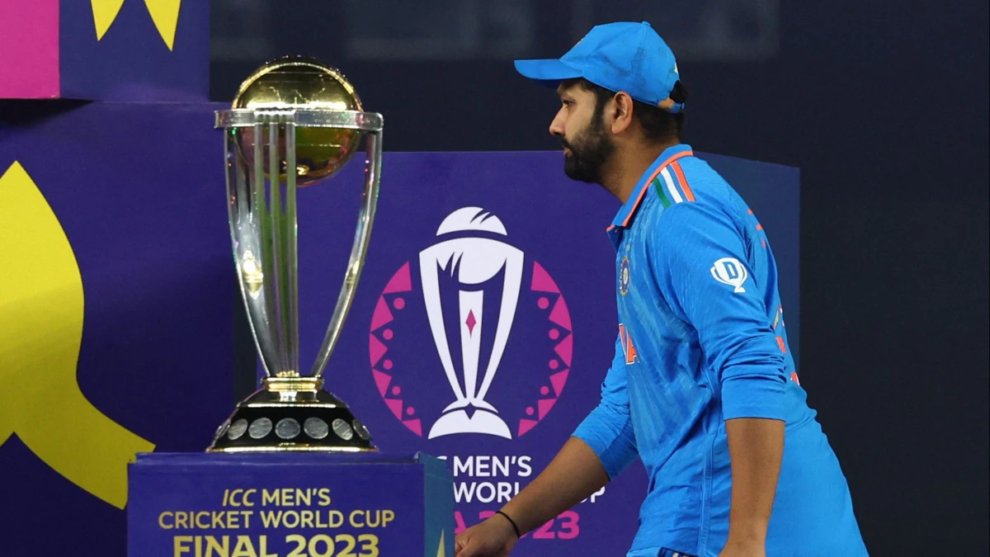Millions of Indians cried along with cricket captain Rohit Sharma on Sunday as he walked off the field, trying to hold back his tears.
His team had just lost the cricket World Cup final to Australia, prolonging India’s painful wait for the glory since 2011. This was arguably his best shot at winning the coveted trophy – he will be 40 years old in 2027, when the tournament will be held next. In theory, Rohit could still play in the next World Cup and give it another try. But the pain of losing at home is likely to linger for a long time.
When India won the trophy in front of an overjoyed crowd in Mumbai in 2011, Rohit was not part of the team. He has been vocal about his disappointment at his exclusion at the time. It would have been poetic justice if he had won on Sunday, not just playing in a home World Cup but also leading his side – that wasn’t meant to be.
But a discussion of just the final will not give you the complete Rohit Sharma story from this World Cup. Look closer and you will see a player who was absolutely sure about his ability to play selfless and fearless cricket in the tournament. As an opener, he was expected to give his side a flying start and take the wind out of the opposition’s attack.
He did that effortlessly. Even in the final, he got off to a fast start. At one point, India were scoring at the rate of 10 runs per over. Some former Indian cricketers have criticised Rohit for losing his wicket to a rash shot in the finals. They argue that it was the match’s turning point.That may well be true but by then, Rohit had already done what he did in so many matches earlier – he had set up a platform for others to build the innings on. But after he departed, the other batters just choked in front of a spirited and tactical Australia bowling attack.
Let’s rewind a bit.
In the group stages, Pakistan set a target of 191 for India to chase. It looked like a sub-par total but then Pakistan had a dangerous bowling attack including Shaheen Afridi, Haris Rauf and Hasan Ali. Matches between arch-rivals Pakistan and India are a sporting spectacle but they also put players under extreme pressure.
Rohit led from the front and scored a brisk 86 off 63 deliveries, effectively ending Pakistan’s hopes of winning the game. He scored more than 40 runs seven times in the tournament, converting three of them into half-centuries. One could argue that he failed to turn these brisk starts into big scores.
But that would be an oversimplification. As he mentioned in different press conferences, every player in the team had clearly defined roles, and his was to be the destructor. India didn’t lose any match until the finals and their success hugely relied on Rohit’s spirited starts which allowed time and pace to players like Virat Kohli, Shubman Gill, KL Rahul and Shreyas Iyer to take the matches deep and put big totals on the board.
Rohit could have easily slowed down after reaching the 40s for bigger scores but that simply wasn’t his role. He was tasked to pace his innings according to the conditions, regardless of where his personal score stood. India’s dominating batting line-up also allowed him to play freely. He knew that the batters who followed him were more than capable of putting the opposition under pressure.
While Rohit the batter has been a revelation in this tournament, his leadership deserves equal praise. His approach as a batter also inspired his crafty tactics as a captain. He earned the respect and trust of his team-mates and support staff, including head coach Rahul Dravid.
His bowling changes and fielding placements were astute and well-timed. When Pakistan were scoring at a brisk pace, he brought Mohammed Siraj back into the attack. Siraj had previously leaked 76 runs against Afghanistan and failed to pick up a wicket. A good captain knows his strategy well, but a great captain knows his players even better.
Babar Azam and Muhammad Rizwan had put together a stand of 81and were threatening to take the game away until Siraj broke their partnership. Rohit also stood firmly behind his players when India were not doing well. He agreed with Dravid’s strategy of believing in the process and not letting results affect the team.
But sporting triumphs don’t happen in a vacuum. The coach-captain duo worked hard in the background for almost two years with an eye on the World Cup. India entered the final undefeated, a result of their patient and astute planning.
Rohit backed players like Iyer, KL Rahul and Suryakumar Yadav when they were not doing well, and they repaid their captain’s faith with match-winning performances in the World Cup. The loss in the final would hurt Rohit, his team and Indian cricket fans for a long time. But it takes nothing away from the captain’s achievements.
He truly is the unsung hero of the tournament and could still make it to India’s World Cup squad four years later. It may sound difficult but then sporting glories are all about making impossible dreams come true. Rohit will surely heal, rebuild and come back stronger because he knows no other way. But for now, the World Cup trophy is still painfully out of his grasp.
Source: BBC News
















